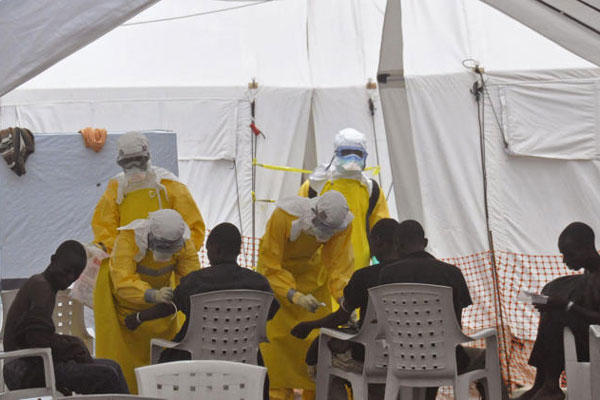Small numbers of highly-trained U.S. troops wearing full-body protective gear have been testing the blood of potential Ebola victims without coming into direct contact with them, the head of the U.S. Africa Command said Tuesday.
Army Gen. David Rodriguez initially said at a Tuesday Pentagon briefing that teams of three or four personnel working at mobile test labs were likely to have direct contact with Ebola victims. However, he later issued a correction to conform with White House and Pentagon policy directives against direct contacts by U.S. troops.
"I want to clarify my remarks," Rodriguez said in a statement. "U.S. military personnel working in the labs are not interacting with patients, only samples."
The work of the small lab teams from the U.S. Naval Medical Research Center was vital to helping stem the spread of history's worst outbreak of Ebola, Rodriguez said.
"Stopping the spread of this disease is the core mission," Rodriguez said at a Pentagon news conference on the military's response that will eventually involve about 4,000 troops.
Rodriguez distinguished between the lab teams that will test the blood of patients and the actual treatment of patients. There were no current plans to have military medical personnel treat patients, Rodriguez said, but he repeated remarks he made at the White House last Friday that the policy might change depending on the spread of the virus.
The military has deployed three of the labs to Liberia. Rodriguez said four more would be sent to do the testing to determine who should be isolated for treatment.
The "fully suited up" teams working at the labs were specialists in nuclear, biological and chemical warfare, Rodriguez said. The teams "are trained to the very highest level of operating in a nuclear, biological and chemical arena, and they are tested continually" for signs of the virus, Rodriguez said.
Other troops deployed to West Africa were not expected to require the full-body protective gear, Rodriguez said. However, they will be outfitted with gloves and masks as a precaution, Rodriguez said.
"They don't need the whole suit as such because they're not going to be in any contact with the people," he said.
Should any U.S. troops be suspected of contracting Ebola, they will be flown in isolation units aboard specially-outfitted aircraft for treatment in the U.S., Rodriguez said.
However, Rodriguez said "I am confident that we can ensure our service members' safety" through extensive pre-deployment training and adhering to strict medical protocols while deployed.
About 350 military personnel are now on the ground in West Africa, the Pentagon said Monday. Rodriguez acknowledged that aid groups have criticized the Defense Department for a slow response, but he said that the U.S. military was taking a deliberate approach to avoid overwhelming the meager and already over-stretched resources of Liberia.
"Their whole nation is overwhelmed," Rodriguez said. "We just don't want to overwhelm them and press things in."
About 700 troops from the 101st Airborne Division led by Maj. Gen. Gary Volesky, the division's commander, were expected to arrive in late October. Once Volesky is on the ground, he will take command of the military's response to Ebola from Army Maj. Gen. Darryl Williams, who will return to his command at U.S. Army Africa.
In a release from U.S. Africa Command Tuesday, Williams said "I owe the best means to move this thing as quickly as possible. This is about urgency and speed. That's what I'm about, urgency and speed. What you're going to see here pretty soon is forces flown in relatively quickly."
Both Williams and Rodriguez noted that President Obama has made the Ebola response a national security top priority. Obama met Monday at the White House with Defense Secretary Chuck Hagel, Gen. Martin Dempsey, the chairman of the Joint Chiefs of Staff, and his national security team on the Ebola response.
At a news conference later, Obama chided the international community for not matching the U.S. response.
"We're having to stand up, essentially, a public health infrastructure in many of these areas that haven't had one before, and that requires an enormous amount of effort," Obama said. "And I'll be very honest with you -- although we have seen great interest on the part of the international community, we have not seen other countries step up as aggressively as they need to."
Obama was to make a rare visit to the Pentagon Wednesday to confer again with top officials on the Ebola response and also on the strategy in Syria and Iraq against the Islamic State.
-- Richard Sisk can be reached at richard.sisk@monster.com































